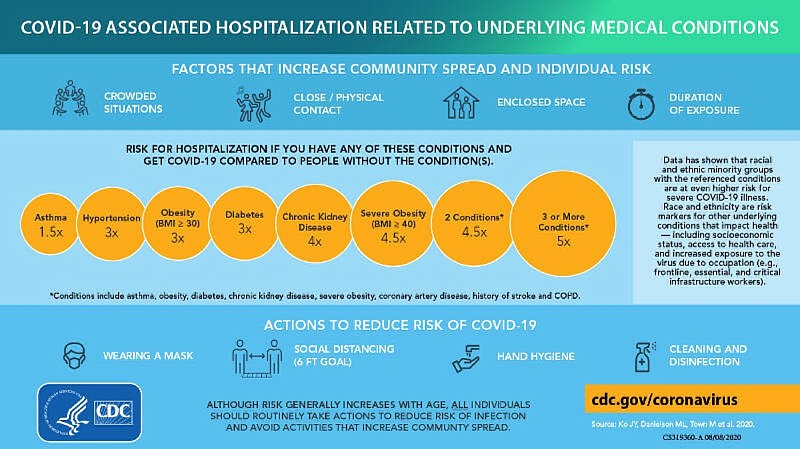Obesity in the United States is at an all-time high at the same time research is showing a strong connection between obesity and serious COVID-19 infection, according to a new report.
The U.S. adult obesity rate reached 42.4% in 2019, according to the annual "State of Obesity" report from Trust for America's Health. Authors of the report said this year's findings mark the first time the national rate has surpassed 40%.
The national rate is considered more accurate than state-by-state rates, because the national rate is based on measurements by doctor's offices, as opposed to self-reporting by residents for state-by-state rates.
Tennessee and Alabama were among the 12 states with the highest self-reported rates of obesity, along with Arkansas, Indiana, Kansas, Kentucky, Louisiana, Michigan, Mississippi, Oklahoma, South Carolina and West Virginia. All 12 states have rates higher than 35%.
Mississippi has the highest adult obesity rate in the country at 40.8%, whereas Colorado has the lowest at 23.8%. Georgia's obesity rate is 33.1%.
Obesity is defined as having a body mass index - a measurement of body fat based on height and weight that's often called BMI - equal to or greater than 30, and it's classified by the American Medical Association as a disease. It is linked to numerous medical problems, including Type 2 diabetes, high blood pressure, stroke, sleep apnea, bone and joint diseases, certain cancers and lower life expectancy.
However, concerns about the impact of obesity have taken on new dimensions with COVID-19. That's because obesity is one of the underlying health conditions associated with the most serious consequences of coronavirus infection, including hospitalization and death.
"These new data mean that 42% of all Americans are at increased risk of serious, possibly fatal, health impacts from COVID-19 due to their weight and health conditions related to obesity," the report states.
Although many of the conditions related to obesity make COVID-19 patients less able to overcome the disease, there's also evidence that obesity itself can increase the likelihood of serious complications from a coronavirus infection, The Associated Press reported.
Dr. Jaime Ponce, medical director of CHI Memorial Weight Management Center, said part of the issue is that fatty tissue causes shortness of breath and makes it harder for the body to absorb oxygen.
"They [obese COVID-19 patients] get the pneumonia type of infection, and they're not going to be able to resist an infection as well, or they're going to need more oxygen faster than a person that is healthier," Ponce said, "so they get sicker faster."
He also said obese people may have a harder time combating the coronavirus because fat cells provide additional receptors for the virus to attach, creating more opportunities for the virus to replicate with a person's body.
One study of more than 5,200 infected people, including 35% who were obese, found that the chances of hospitalization rose for people with higher BMIs, even when taking into account other conditions that could put them at risk.
Another issue is chronic inflammation, which often comes with obesity. Inflammation is a natural way people's bodies fight harmful intruders like viruses. But long-lasting inflammation isn't healthy and could undermine the body's defenses when a real threat arises.
"It's like pouring gasoline on a smoldering fire," Dr. Dariush Mozaffarian, an obesity researcher and dean of Tufts University's school of nutrition science and policy near Boston, told The Associated Press.
Thursday's report is based in part on 2019 data from the U.S. Centers for Disease Control and Prevention's Behavioral Risk Factors Surveillance System and analysis by Trust for America's Health.
"Solving the country's obesity crisis will require addressing the conditions in people's lives that lead to food insecurity and create obstacles to healthy food options and safe physical activity. Those conditions include poverty, unemployment, segregated housing and racial discrimination. This year's pandemic has shown that these conditions don't only increase the risk of obesity and chronic illnesses, they also increase the risk of the most serious COVID outcomes," John Auerbach, president and CEO of Trust for America's Health, said in the report.
As recently as 2012, no state had an adult obesity rate above 35%, according to the report. In 2000, no state had an adult obesity rate above 25%.
Ponce said it will be an uphill battle to reverse America's worsening obesity crisis because the food industry is powerful and our modern lifestyles often lack sufficient levels of physical activity.
However, there is some progress, he said. For example, food labels contain more information and some states require restaurants to list how many calories menu items contain.
"Tennessee has a problem of obesity, and I think there has to be awareness. People also need to be aware that there are treatments and management," Ponce said. "There's many ways that this problem can be helped with a diet, exercise, lifestyle change. There are even medications, and of course for the severely obese, there are some surgical options that can be used. People don't need to feel that there's no solution to this."
The Associated Press contributed to this story.
Contact Elizabeth Fite at efite@timesfreepress.com or follow her on Twitter @ecfite.
